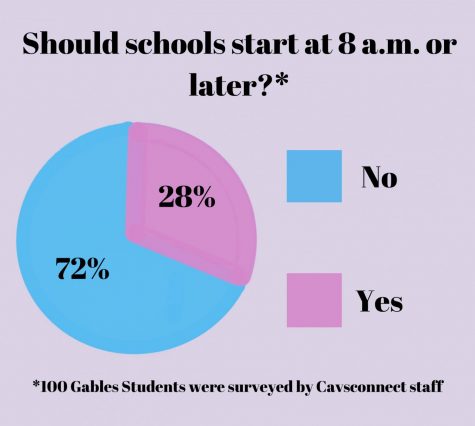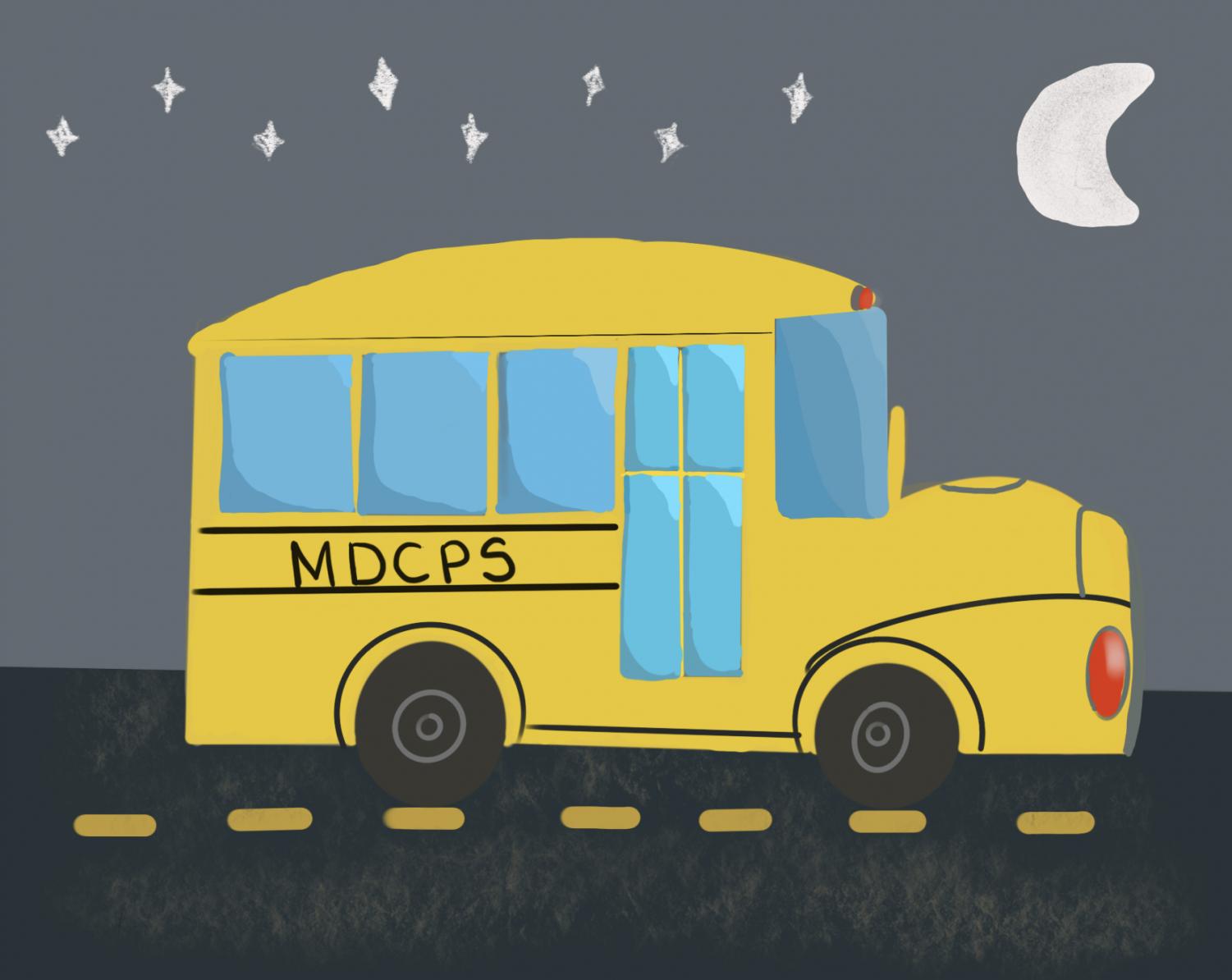MDCPS’s Newest Policy: Signs of the Times
Dec 18, 2019
On Wednesday, Nov. 20, it was announced by Miami-Dade County Public Schools’ Superintendent, Alberto Carvalho, that the school board is deliberating on the concept of later start times for schools around Miami-Dade. Below is a side-by-side piece juxtaposing the benefits and drawbacks of this proposed policy, and how it can affect not only students at Gables, but students across the county.
School Times Are Changing, and It’s About Time
Growing up in the Miami-Dade County Public Schools system, students are raised to wake up when sunlight is just beginning to strengthen. By the time they got to school, it was bright and felt like a new day. Once they make the transition to middle school, the sun is beaming from the moment their eyes opened to the end of the school day. Suddenly, once they reach high school, it is pitch black when they first get out of bed and the sun is just rising when they get to school. At the point throughout education where students need the most sleep, they are instead forced to wake up the earliest.
After years of contemplation, the county has finally decided to bring up the conversation of when high schools should start in comparison to primary school. This has been a burning question for years, and its upbringing has caused commotion among the student body as well as staff members county-wide, and it is about time that there is something done to hopefully resolve this issue.
At Coral Gables Senior High, it seems as though the most common conversation among the student body is how tired and sleep-deprived everyone constantly is. Studies show that most high school students do not go to sleep before 11 p.m., when in reality, a teenager should be sleeping earlier than 9:30 p.m. to get enough sleep to function well the next day. Most students have extracurricular activities or jobs after school that force them to hold homework until later in the day, keeping them up doing homework extremely late.
“I totally agree with schools starting later than they do currently because some students have after-school activities that they need to attend to, and loads of homework, and they end up going to sleep really late. They then have to wake up really early to sometimes catch the bus, or have a long drive because of the distance they may live from school,” junior Melany Cervelo said.
The focus on off-campus activities is driven from the thinking that colleges expect students to be well-rounded on and off their high school campus. In this sense, students are also expected to maintain a high grade-point average while taking rigorous courses. How is it that students are expected to spend hours after school undertaking an outside project which forces them to get home at a late time, complete the homework for all of their classes and be asleep by 9:30 p.m.?
The truth of the matter is that it is impossible to even get near your bed before 10 p.m., and if your goal is to actually exceed in all of these areas, sleeping before 11 p.m. is only a dream. To go to sleep past this time after an exhausting day then having to wake up at around 6 a.m. the next day to repeat it all again is exhausting. It is only a matter of time before the students are worn out and lose motivation to do well due to their fatigue.
According to a number of studies, teenagers need eight to 10 hours of sleep each night. Lack of sleep affects the ability to concentrate, learn and listen in a classroom setting. It also tends to cause extreme impatience and aggression, overeating and additional stress. For a teenage brain to develop, sleep is vital, yet it seems as though most of the teenage population is not getting near as much as they need. It is impossible to do so when you have to wake up early enough to be in class by 7:15 a.m., demonstrating how the exceedingly early start to the school day affects students.
“I personally think that school start times should be later because I find myself and all my peers being extremely exhausted during school. People often end up taking long naps after school to make up for the sleep they lack. The fact that I live far away makes me have to wake up at extremely early times and it is so hard to focus in my first couple of classes,” sophomore Ella Londono said.
It is also clear that in this generation, mental health is generally disregarded, causing the number of teenagers dealing with disorders to skyrocket. It has been proven time and time again that more teenagers are dealing with mental illnesses now more than ever. Students put academics over their well-being, leading them to work endless nights and adding continuous stress. Already having constant academic pressure, additional stress from lack of sleep only hurts them even more. The irritation caused by sleep deprivation plays a huge role in mental health as well. Imagine a teenager staying up late to study for a test and doing poorly on it. With a sleep-deprived mindset which already makes teens more emotional, realizing that they wasted sleep over something they did not end up doing well on will only make them less motivated. A lack of sleep causes students to lose interest in excelling in a school setting, which will affect them for the rest of their academic careers. The mental health of high school students is being disregarded the longer they are forced to wake up at an unreasonable time because their exhaustion causes a much more aggressive take on everything they encounter.
With this understanding, the county contemplating changing the start times of a school day seems sensational. It is exactly what high school students need, especially because this period of time is the most significant for brain development. Making a school day start later will allow students much more flexibility in their schedules as well as a calm mindset. It would reduce the anxiety in teenagers and allow them to be a lot more successful due to their peaceful state of mind.
Many argue this belief by saying that students will only react to later school times by sleeping later. In reality, how much later can students really go to sleep? Most are already ending their days at around midnight. At that point, it would not make a difference if they stay up or not because the amount of time they would sleep then is equivalent to the they are getting now.
The best case for all students is to have a later start time for school days as it will allow students to get the amount of sleep that they actually need. The only way to resolve the prominent issue of over-exhaustion among adolescents is to allow schools to start later. In this moment in time, a shadow of fatigue and weariness hangs over the student body. The only way to fix that is by allowing them to see the light of day when they get to school.

Jana Faour is a International Baccalaureate junior at Coral Gables Senior High who is entering her second year of CavsConnect. One of her many passions...
A Later Start to School? No, Not the Time
Last month, on Nov. 20, Superintendent Alberto Carvalho tweeted that the school board is currently discussing starting all schools in Miami-Dade County at 8:00 a.m. or later. This may seem to be a blessing, because who would reject an extra hour of sleep? Well, the issue is not that simple. It has been promoted by Carvalho and the general media as a way to “keep students from riding the bus in the dark”, but that is only one side of it. With this change, students would end school a minimum of one hour later as well.
The entire idea of pushing school times is pointless because students will remain sleep-deprived, potentially to a further extent than ever before. Additionally, after-school activities would perfectly align with the nationally-renowned Miami traffic and the low-income teens in the county supporting their families with their income from working after school could lose an hour of work in their schedule.
“Getting out of school later is not a good idea because I would get home a lot later, giving me less time to do homework and making me go to sleep a lot later, leading to the same amount of sleep I currently get,” sophomore Joaquin Breslin said.
Nationwide, sleep deprivation in teens is a major dilemma. Students in content-heavy courses, such as Advanced Placement courses, can sometimes have about five hours of homework every night. With this massive workload, high school students are getting less sleep than ever before. Along with this workload, the competition of the college entrance process has made it necessary for students to get involved in as many extracurriculars and sports as possible. The “extra hour” would only back up students’ schedules, shifting all of their work an hour or more later. The end of after-school activities would coincide with the traffic rush around 5:00 p.m. Because they know they get to wake up later, students would then misinterpret the extra time as an excuse to go to bed even later than they already do. The later school times would develop even unhealthier habits for students, lasting long into their adulthood.

After surveying 100 students, the Cavalier student body has spoken and it was found that students favored keeping the school times as they currently stand.
Miami-Dade County Public Schools (MDCPS) cannot implement this policy for the sake of the students that work to support their families. About 74% of students currently enrolled in MDCPS schools live in low-income households. Once students reach high school, many are expected to “pull their weight” in their household by earning a part-time wage.
This money can mean a world of difference for the families that live paycheck-to-paycheck, sometimes keeping their families off of the brink of homelessness. With the school times being shifted back an hour, many high school students would not have enough time after school to get to their jobs. For some, this would mean that they would have to quit; others that cannot afford to quit might jeopardize their future careers and stop going to school if their families relied on the money they made with that part-time job. This policy change, to some extent, can be quite frankly considered classist and ignorant, failing to take into account the needs of our low-income community.
“As a Gablette, I leave school late because of practice. If this changed, they would move my practice to end at 8:00 p.m. instead of 7:00 p.m,” sophomore Paulina Texier said.
Many people including Superintendent Carvalho believe that logistically and financially, this change is necessary and in benefit to the county. This is partially true, as less bus drivers would need to be paid to drive in the early hours of the morning. However, by putting this protocol in place, the county is putting the frugality of MDCPS before the needs and well-being of students. The change would cause a major shift in every aspect of their lives, but the officials that are pushing for the change do not understand the gravity of the circumstance. To them, it is just another implementation to look appealing on their resumés or a tactic to add to their political agenda. The “No School Buses Before Dark” idea can impact the lives of all students in the county, but if the school board and superintendent do not pay attention to the opinions of the students themselves, there could be massive repercussions.
On the superficial level, this policy change may appear to be a grand idea. In reality, students will develop even worse sleeping habits and will get home much later because of their after-school activities. Students that rely on part-time jobs after school might not have the chance to earn this money, meaning that more students would drop out of high school to work. If MDCPS really wanted to improve the lives of students and allow them to get more rest as they say they do, they would unify with the state of Florida to reduce the pressure of our state’s standardized tests and end-of-course assessments that only add to our current workloads. Testing and overworking students is at the heart of the issue, but failure to address any of those concerns will leave the county in the same position as it is now.

Maïa Berthier is a senior in the International Baccalaureate program at Coral Gables Senior High. This is her fourth year in CavsConnect and second year...
